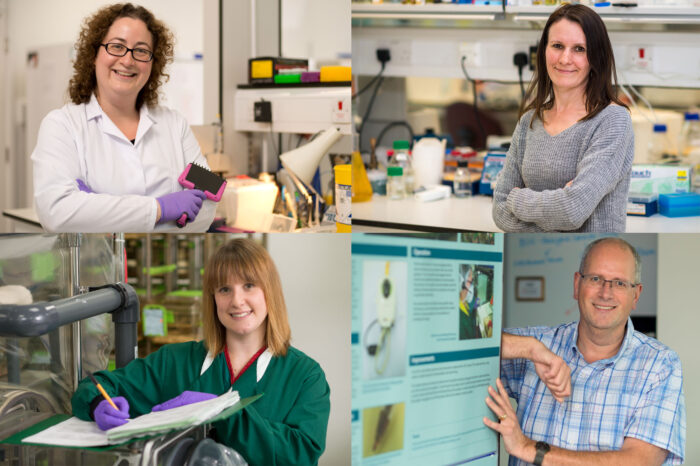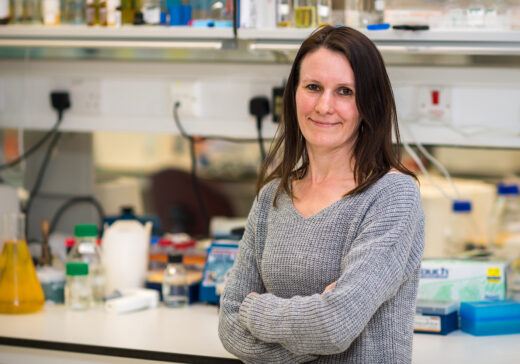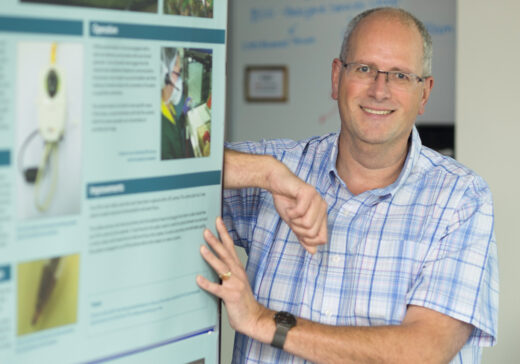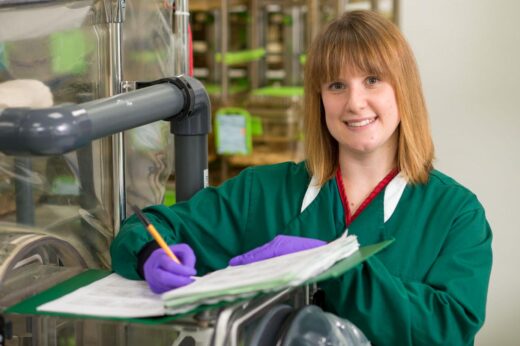
The LMB is proud to support the Technician Commitment – a sector-wide initiative led by the Science Council and the Gatsby Foundation to help highlight and safeguard key technical skills. The Commitment addresses four target areas to help address key challenges faced by technical staff working in research; visibility, recognition, career development and sustainability.
To support this the LMB is an active member of the Research Institute Technician Group and has also formed a new Technician Committee, led by Alison Lane, Head of Genotyping Services. This year has seen progress towards our commitment aims, and here we celebrate professional registration of two LMB technical specialists, and success at the Research Institute Technicians Awards.
Professional Registration
The LMB Technician’s Committee actively supports professional registration, which formally recognises the unique skillset of technical specialists. Here Jo Chesham and Darren Egan, who both achieved professional registration this year, share their motivations and experiences of going through the registration process:
Jo Chesham

What is your position at the LMB?
I am a Research Support Technical Officer in Michael Hastings’ lab in the Neurobiology Division. We research circadian rhythms and sleep, investigating how the principle circadian body clock maintains synchrony with peripheral clocks to coordinate physiological and metabolic rhythms. I work on a variety of projects and my daily duties can range from using in vivo and ex vivo techniques, molecular biology, acquisition, analysis and presentation of data, as well as teaching techniques to others in the group.
Why did you decide to pursue professional registration and what have you gained from it?
I initially registered with the Royal Society of Biology because I wanted to pursue registration at Chartered Scientist (CSci) level to recognise all the skills and knowledge that I have gained during my time working at the LMB. Becoming a Chartered Scientist awards me with a mark of excellence, giving me credibility among the wider scientific field as an endorsement of my professional skills and competence. It has opened my eyes up to other opportunities and improved my career prospects. I am proud to be a member of the Royal Society of Biology (MRSB) and the access to the Continuing Professional Development (CPD) framework that it provides allows me to maintain and progress opening up further opportunities in my career.
What did you have to do to become registered?
To become registered, I wrote up a report detailing how I achieved each essential competence at the standard required using a variety of examples from my day-to-day work over the past 3-5 years. The whole process reminded me of the diverse projects I have been involved in over this period and gave me a greater sense of achievement and self-esteem. I now help mentor other applicants at the LMB through the registration process and am part of the Technician Committee.
Would you recommend registration to others?
Yes, I would recommend Professional Registration for others as it improves your career prospects and employability by demonstrating your competence and knowledge within the profession. It also is a useful reflective exercise scrutinising and evaluating your achievements and skills and identifying areas for development. I would advise looking into the Professional Body to make a careful decision on the most appropriate one for you. In addition, attending a workshop with the Science Council is also a useful starting point. Then you can allow yourself dedicated time to detail your competency examples.
Darren Egan

What is your position at the LMB?
I’m the Training and Database support manager for the LMB’s Biological Services Group. My main role is to oversee and support training involved with the use of mice at LMB, making sure that we comply to UK legislation and that all users are competent to perform their tasks. I also help police a couple of the databases that we use, including data requests and training.
Why did you decide to pursue professional registration and what have you gained from it?
I’d already been a Registered Animal Technician since 1992 through the Institute of Animal Technology but this also looked like a worthy award to aim for. I didn’t leave school with many exams but have gradually added awards and professional qualifications during my career. I’d been aware of the Technicians Commitment for quite a while through my contacts with other organisations in the Cambridge area so was really pleased when the LMB signed up to it as well. I saw this as both a new challenge during Covid restrictions and also as a way of supporting professional registration and the Technicians Commitment at LMB. Leading the way if you like.
Since passing the competency report as part of the registered technician entry requirement, I have become a Member of the Institute of Science and Technology (MIScT) as well as a Registered Science Technician (RSciTech) through the Science Council. On completing entry to the IST, I have become more aware of other networking opportunities and seminars relating to technicians – but for me the main gain is the self-satisfaction of passing a significant award even though I’m the wrong side of 55!
What did you have to do to become registered?
Some of the registration was straightforward; writing a CV, choosing an awarding body and giving proof of existing qualifications. The major part of registration came during the writing of the competency report – which when completed was nearing 12,000 words. The hardest part was relating what I did in my current job role to demonstrate that I fulfilled the requirements to gain registration. You can also interview for registration which may have been slightly less work but maybe more stressful! During Covid, written application seemed the way to go.
Would you recommend registration to others?
I would always recommend being part of a professional body for your particular technical discipline. Not only does it show your commitment but it makes you a more valuable member to the organisation. This registration has given me a confidence boost, knowing that there are still challenges and opportunities available. My advice to other technicians considering registering would be you must be self-motivated and ready for a challenge.
Research Institute Technician Awards
Recently MRC Harwell hosted the inaugural Research Institute Technician Symposium. They welcomed representatives from nine research institutes to foster collaboration in order to better support the Technicians Commitment within each institute. Participants came from the MRC Laboratory of Molecular Biology (LMB), MRC Harwell, MRC London Institute of Medical Sciences (LMS), John Innes Centre, Francis Crick Institute, The Institute of Cancer Research, Babraham Institute, Wellcome Sanger Institute and the Science and Technology Facilities Council.
The symposium concluded with the first ever Research Institute Technician Awards (RITAs), which seeks to celebrate the skills, talent, experience and dedication of technical experts across the participating institutes. Nominations from all institutes were invited across nine categories, and were awarded by Kelly Vere MBE, Programme Director for the Technician Commitment.

The LMB is delighted that Helen Cooper, Breeding Facility Manager of our Biological Services Group, has been awarded a RITA in the category of ‘Contribution to Outreach of Knowledge Exchange.’ Helen accepted her prize over Zoom, to a big cheer from the symposium attendees at the ceremony.
Helen has been actively involved in outreach and engagement activities since 2012. She regularly visits schools, colleges and engages online to highlight the role of an animal technician and her open approach has helped to dispel common myths about the use of animals in science. Helen is passionate about animal welfare and scientific advancement and has dedicatedly shared this knowledge with young people to educate them in science and promote the career of an animal technician.
Commenting on the award Helen said “I have loved being active in outreach and engagement over the years, so to be recognised for this through the RITAs has been fantastic! I feel a real sense of pride and hope that I can inspire others to share their knowledge and experience too.”
Alison Lane, head of the LMB’s Technician Committee, added, “Recognising the talent and achievements of our technical specialists at LMB is a key aim of the Technician Commitment, and Jo, Darren and Helen exemplify this. The committee is looking forward to working with LMB technical specialists in 2022 to enable them to get involved with a variety of Technician Commitment opportunities and demonstrate their abilities through professional registration.”